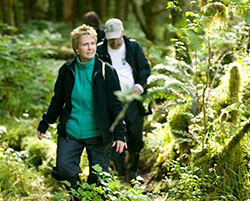Page Content
Health

Nutrition
In order to safely participate in any outdoor activity, you need to properly fuel and hydrate your body. Before heading outside, grab a nutritious snack such as a piece of fruit, yogurt, a handful of nuts and some water or juice to hydrate and pump up your energy stores. Pack an additional nutritious snack and water to take along. Check Canada's Food Guide for healthy eating guidelines and nutritional tips.
Sun
Be sun safe while you’re outside:
- Stay out of the sun between 11 a.m. and 3 p.m.
- Liberally apply "waterproof" sunscreen on or near the water - remember to re-apply again after swimming.
- Wear a brimmed hat, sunglasses, and a breathable long-sleeved shirt and pants to protect you from the sun more thoroughly than sunscreen.
Hydration
Your normal daily fluid intake requirement can be significantly affected by exercise, sweating, heat or altitude. Be sure to monitor your hydration and proactively drink before you feel thirsty – sometimes your thirst indicator may malfunction when you’re already dehydrated. Pace yourself and allow your body to adapt to the heat and/or altitude.
Watch for early symptoms of dehydration including decreased coordination, lethargy, and impaired thinking. Dehydration can quickly lead to heat cramps, heat exhaustion, and in extreme cases, heat stroke.
If you feel symptoms of dehydration or heat cramps, replenish lost fluids and electrolytes through a sports drink or by eating salty foods and drinking water. If you feel symptoms of heat exhaustion, drink plenty of fluids and cool your core. For severe cases, including heat stroke, treat as for heat exhaustion and immediately seek emergency medical attention.
Hypothermia
Hypothermia is abnormally low body temperature resulting from exposure to cold temperatures but can occur at even cool temperatures if you are chilled from rain, sweat or immersion in cold water. Dress properly – in warm layers and with waterproof clothing - to prevent hypothermia. Watch for symptoms including shivering, confusion, slurred speech, drowsiness, low energy.
If you feel symptoms of hypothermia immediately get indoors and into warm, dry clothing. Wrap yourself in a warm blanket and drink a warm beverage (not alcohol or hot coffee). Get medical attention as soon as possible.
Ticks

Ticks are commonly found in tall grassy areas or wooded areas in British Columbia. They are very small bugs – less than the surface area of your pinkie fingernail – which normally bite animals to feed on their blood. However, on occasion, ticks will bite humans instead.
Though the odds of contracting an infection from a tick bite are low, there have been reported cases of Lyme Disease from tick bites in BC, so it is worthwhile to take measures to avoid being bitten. When in tick country - be sure to stick to cleared paths and trails; tuck in all clothing, including pants into socks; use insect repellant containing DEET. When leaving tick country – check all clothing, skin and hair for ticks; and, always check your pets for ticks.
You should be able to recognize a tick and know how to remove it, should you find one. If the tick is not buried too deeply into your skin, use tweezers to grab its body and slowly extract it from your skin. Do not squeeze the body. Ensure that you remove all body parts from the site. Clean and disinfect the wound and wash your hands with soap and water. If the tick is buried deep into your skin, have a doctor remove it in order to help prevent infection. Read more on tick safety.
Water Purification
Though Canadian wilderness streams and lakes may seem clean, clear and potable, don’t take any chances. Many surface waters can contain parasites that can quickly cause diarrhea, nausea and/or vomiting if ingested. Think before you drink. Always purify any water that you have not packed-in yourself. Backcountry travelers should always boil any “natural” water for at least 2 minutes (preferred method), or chemically purify it, before using it to drink or to brush teeth. These processes will kill bacteria, viruses and parasites that may have found their way into the water.


